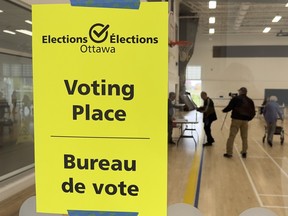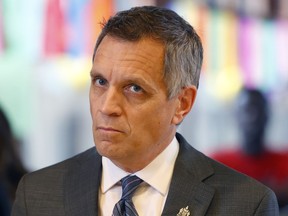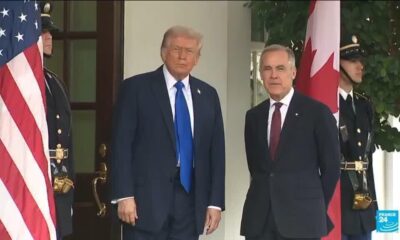Politics
Ottawa Councillor Faces Audit Over $310 Discrepancy in Expenses

A compliance audit revealed that Shawn Menard, a councillor representing Capital ward in Ottawa, understated his 2022 election campaign expenses by $310.98. This discrepancy has raised questions about electoral fairness and the integrity of campaign finance reporting. The audit, presented to the election compliance audit committee on August 22, 2024, highlighted the need for scrutiny in campaign financing.
The third-party audit assessed Menard’s reported expenses against the actual market value of reused campaign materials, primarily signs from the 2018 election. While Menard acknowledged the audit’s findings, he maintained that there were no significant irregularities and argued that the issue did not warrant further public interest. Nevertheless, the implications of this small discrepancy could lead to serious consequences, including potential legal action under the Ontario Municipal Elections Act.
Edward Phillips, a retired developer and private citizen, lodged the complaint that initiated the audit. His lawyer, John Pappas, expressed concerns that the understated expenses provided Menard with an unfair advantage over his competitors. Pappas argued that the failure to disclose the true value of campaign materials hinders public confidence in the electoral process.
Under the provisions of the Municipal Elections Act, any eligible voter can request a compliance audit if they suspect a candidate has violated campaign finance regulations. The complaint must be submitted within 90 days following the deadline for filing campaign financial statements. The compliance audit committee then reviews the application and decides whether it warrants further investigation. Although the committee ultimately chose not to prosecute Menard, it acknowledged that an apparent violation of the Act had occurred.
The committee’s decision not to pursue legal action mirrors a similar case in September 2024, when no proceedings were initiated against Doug Thompson, another candidate facing scrutiny over election finances. Such decisions highlight the ongoing debate regarding the balance between strict adherence to electoral laws and the potential chilling effect on candidates who may fear excessive scrutiny.
Pappas argued that Menard, as an experienced candidate, should have known the importance of accurate financial reporting. He emphasized that any misrepresentation not only undermines electoral integrity but also threatens the objectives of transparency and accountability outlined in the Municipal Elections Act. In contrast, Stéphane Émard-Chabot, a former Ottawa city councillor representing Thompson, cautioned against setting expectations for absolute perfection in campaign finance reporting. He noted that the volunteer nature of many campaigns could lead to inadvertent errors, suggesting that not every discrepancy necessitates a costly audit.
The financial implications of such audits are significant. While the City of Ottawa has not disclosed the total cost of the 2022-2026 election compliance audit process, city clerk Caitlin Salter-MacDonald stated that a detailed report would be presented to the city council once all proceedings are concluded. The potential for frivolous complaints raises concerns about the burden on taxpayers, as a single complaint can trigger extensive audits that may strain municipal resources.
The interpretation of compliance audit requirements varies across Ontario. In Menard’s case, the court ruled that discrepancies mandated an audit, while other jurisdictions, including Toronto and Hamilton, have adopted a more discretionary approach. Émard-Chabot argued that compliance audit committees should have the authority to assess the intent behind discrepancies, as well as the overall context of a candidate’s financial reporting.
As the discussions surrounding electoral compliance continue, the implications of the Menard audit serve as a reminder of the delicate balance between maintaining electoral integrity and ensuring that candidates are not deterred from participating in the democratic process. The ongoing legal landscape surrounding campaign finance in Ontario remains fluid, with potential changes on the horizon that could redefine how compliance is enforced.
The deadline for any legal action regarding the 2022 municipal election is set for November 15, 2026, allowing time for further developments in this complex and evolving situation.
-

 World3 months ago
World3 months agoScientists Unearth Ancient Antarctic Ice to Unlock Climate Secrets
-

 Entertainment3 months ago
Entertainment3 months agoTrump and McCormick to Announce $70 Billion Energy Investments
-

 Lifestyle3 months ago
Lifestyle3 months agoTransLink Launches Food Truck Program to Boost Revenue in Vancouver
-

 Science3 months ago
Science3 months agoFour Astronauts Return to Earth After International Space Station Mission
-

 Technology2 months ago
Technology2 months agoApple Notes Enhances Functionality with Markdown Support in macOS 26
-

 Top Stories2 weeks ago
Top Stories2 weeks agoUrgent Update: Fatal Crash on Highway 99 Claims Life of Pitt Meadows Man
-

 Sports3 months ago
Sports3 months agoSearch Underway for Missing Hunter Amid Hokkaido Bear Emergency
-

 Politics3 months ago
Politics3 months agoUkrainian Tennis Star Elina Svitolina Faces Death Threats Online
-

 Technology3 months ago
Technology3 months agoFrosthaven Launches Early Access on July 31, 2025
-

 Politics3 months ago
Politics3 months agoCarney Engages First Nations Leaders at Development Law Summit
-

 Entertainment3 months ago
Entertainment3 months agoCalgary Theatre Troupe Revives Magic at Winnipeg Fringe Festival
-

 Politics2 weeks ago
Politics2 weeks agoShutdown Reflects Democratic Struggles Amid Economic Concerns





















